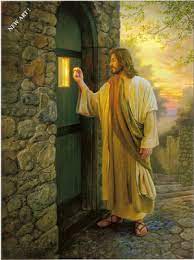
Gird your loins and light your lamps and be like servants who await their master’s return from a wedding, ready to open immediately when he comes and knocks. Blessed are those servants whom the master finds vigilant on his arrival. Amen, I say to you, he will gird himself, have them recline at table, and proceed to wait on them. And should he come in the second or third watch and find them prepared in this way, blessed are those servants. (Luke 12:35-38)
There are two versions of the Parable of the Vigilant Servant (Matthew 24:25-51, Luke 12:35-46). Luke’s version contains a unique concept: for the servants who have been vigilant for the Master’s coming, the Master will gird Himself and wait on the servants who recline at table (cf. Luke 12:37). There are so many interpretations to this verse; some commentaries connect it to the washing of the feet at the Last Supper, while others make a reference to the ancient Roman festival of Saturnalia, in which masters take on the role of slaves and serve their slaves. But the only interpretation that really makes sense is that in this verse, Jesus gives us a glimpse of what it would be like in heaven. Jesus calls these servants ‘blessed;’ they have been received into heaven, where the heavenly blessings will be given to them by their Master.
Be sure of this: if the master of the house had known the hour when the thief was coming, he would not have let his house be broken into. You also must be prepared, for at an hour you do not expect, the Son of Man will come. But if that servant says to himself, ‘My master is delayed in coming,’ and begins to beat the menservants and the maidservants, to eat and drink and get drunk, then that servant’s master will come on an unexpected day and at an unknown hour and will punish him severely and assign him a place with the unfaithful. (Luke 12:39-46)
The words ‘the Son of Man will come’ (Luke 12:40) undoubtedly refers to the Parousia, or the second coming of Christ in glory at the end of time. The parable of the thief who comes at an unexpected time emphasizes the importance for the disciples to be faithful to the instructions of Christ until He comes again. Yet, there are some who tend to think that the Master’s coming would be delayed. The ‘beating of the menservants and maidservants, eating and getting drunk’ (Luke 12:45) represents a life of sin. These servants think that they have the time to disregard the Master’s instructions and live a life of carousing and attacking others. The presumption here is that these servants plan to clean up their act at the last minute, just before the Master returns. But Jesus makes it clear that His second coming would be unexpected, so that plan would never work.
These Gospel passages regarding the unexpected time of the Lord’s second coming sends a clear message that a Christian must live out the Gospel consistently. Christians inevitably fall into sin again and again, but any breaks in consistency must be addressed without delay so that the Christian can get back on the right path.
Why do we come to Mass? Is it because we want to receive the Eucharist? Or is it because we want to offer thanksgiving to God or to fulfill an obligation? Those are all good and right reasons. In light of the Gospel teaching of being prepared for the Lord’s second coming, another reason why we should come to Mass is because we are sinners. Regularly coming to Mass gives us the chance to address the breaks in consistency in living a Christian life. Regularly going to confession also does that for us. Through the Church, Jesus gave us these two wonderful sacraments so that we can get back on the right path.
Do you have Catholic relatives and friends who no longer come to Mass? Have you asked them why? I have heard some who say that they no longer have the time, or that they no longer see the point of coming to Mass. Some have said that Mass is only for holy people, or that they didn’t want to pretend to be holy. That is so untrue. We come to Mass because we are sinners. Jesus came not for the righteous but to call sinners (cf. Luke 5:32). For those who think that they are perfect, there is nothing that Mass and confession can do for them. But if you admit that you are a sinner, then Mass and confession are definitely for you.
Repentance is a life-long process and chances are, we may never be perfect when the Lord comes, but our perseverance in this life-long process demonstrates our love for God and our neighbor. Whenever we say, “I love you, Lord” is not just empty talk.